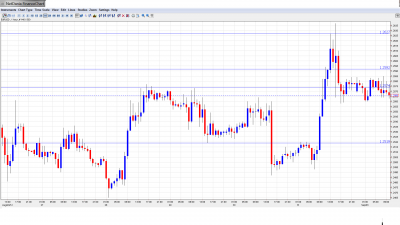EUR/USD is steady at the start of the new trading week, after Fed Reserve Chairman Bernard Bernanke’s disappointing speech in Jackson Hole. Bernanke did little more than reiterate that the Fed would remain on the sidelines, but was willing to intervene if economic conditions worsened. In economic news, there was a positive release out of Spain, as Manufacturing PMI climbed to a five-month high. The Italian Manufacturing PMI, however, came in lower than the market estimate. ECB head Mario Draghi,who opted to skip the central bankers’ meeting in Jackson Hole, speaks later today.
Here’s an update about technical lines, fundamental indicators and sentiment regarding EUR/USD.
EUR/USD Technical
- Asian session: Euro/dollar moved up to 1.2587 and consolidated at 1.2575. The pair is unchanged in the European session.
- Current range: 1.2520 to 1.2587.
Further levels in both directions:
- Below: 1.2520, 1.2440, 1.24, 1.2360, 1.2330, 1.2250, 1.22, 1.2144, 1.2043, 1.20, 1.1876 and 1.17.
- Above: 1.2587, 1.2623, 1.2670, 1.2743 and 1.2814.
- 1.2587 is the next resistance line, 1.2623 is much stronger.
- 1.2520 is providing weak support, and may continue to be tested.
Euro/Dollar steady after Bernanke speech – click on the graph to enlarge.
EUR/USD Fundamentals
- 7:15 Spanish Manufacturing PMI. Actual 44.0 points.
- 7:45 Italian Manufacturing PMI. Actual 43.6 points. Exp. 44.9 points.
- 8:00 Euro-zone Final Manufacturing PMI. Actual 45.1 points. Exp. 45.3 points.
- 13:30 ECB President Mario Draghi Speaks.
EUR/USD Sentiment
- Bernanke disappoints at Jackson Hole: If expectations were low prior to Fed Reserve head Berananke’s remarks, then he certainly didn’t disappoint. In a highly-anticipated speech, Bernanke dished out little more than what he’s been saying for months – the Fed was closely monitoring the US economy, and was willing to intervene and stimulate the economy with easing measures if conditions worsened. In other words, the Fed will continue to cling to the sidelines and there will be no QE3 in September.
- Markets Eye Draghi Speech, ECB Policy Meeting: With Jackson Hole behind us and nothing new from the Fed, the market focus shifts to Brussels this week. ECB President Mario Draghi will be discussing banking union at a parliamentary meeting in Brussels later today. On September 6, the ECB convenes for an important policy meeting, and the markets will be looking for some concrete proposals, such as how to lower borrowing costs for struggling Euro-zone members, notably Spain and Italy. That same day, the ECB will announce its interest rate decision, and the central bank is expected to provide details to the general bond buying blitz plan introduced in early August.
- Spanish regions request help: After Catalonia asked for 5 billion euros of aid, also its southern neighbor joined in. This adds pressure on the central government to hurry up and ask for aid. In an ominous development, a senior Spanish military officer threatened that any unilateral steps by Catalonia towards independence would be met with military force. There are reports of ongoing negotiations between Spain and its European peers regarding a formal aid request. Spain is due to repay over 30 billion euros in October, so expect some agreement to be hammered out very shortly.
- Slovak surprise: Robert Fico, the old/new PM of Slovakia hurt the vulnerable euro with a unexpected statement about a 50/50% chance of a euro breakup. Slovakia, a member of the euro-zone, has taken its time in the past with ratifying one of the deals. In Finland, another core country, the population is actually less euro skeptic than previously thought.
- Bond market expecting action: In the meantime, Spanish and Italian yields are doing OK, in anticipation of the ECB blitz. Thursday’s Italian 10-year Bond Auction saw yields drop to 5.82% from 5.96% in July. Recent Spanish 10-year yields have been fairly steady, in the 6.40% range. This is a far cry from the unsustainable rates above 7% which we saw just several weeks ago.
- Greek situation still dire: Greek Prime Minister Antonis Samaras is seeking an extension until 2016 to meet the bailout targets. but unhappy German officials have tersely responded that “more time means more money”. Greece’s coalition partners are negotiating a new austerity package, which Samaras promises to be the last one. Talks with the troika are due to resume this month, so expect lots of headlines out of Athens.
- German officials express mixed views about the Grexit: It was refreshing to hear some German politicians talking about the geopolitical importance of Greece (a NATO member) and not only look at a Grexit from a pure economical view. However, discussions about a manageable Grexit are getting louder: this time from the ECB’s Jörg Assmussen, that echoed Eurogroup chief Juncker. German grumbling is growing over Greece’s request for an extension, and a senior member of the Christian Social Union, a coalition partner, said he saw Greece leaving the euro next year. Other coalition partners are dead set against providing Greece with more time or money. See how to trade the Grexit with EUR/USD.

